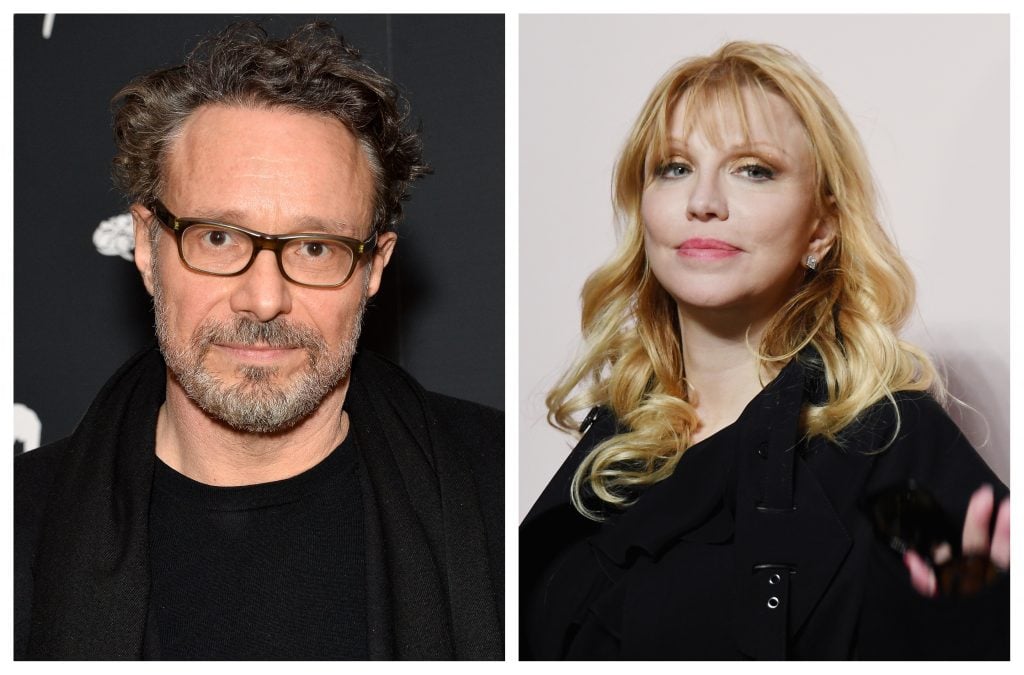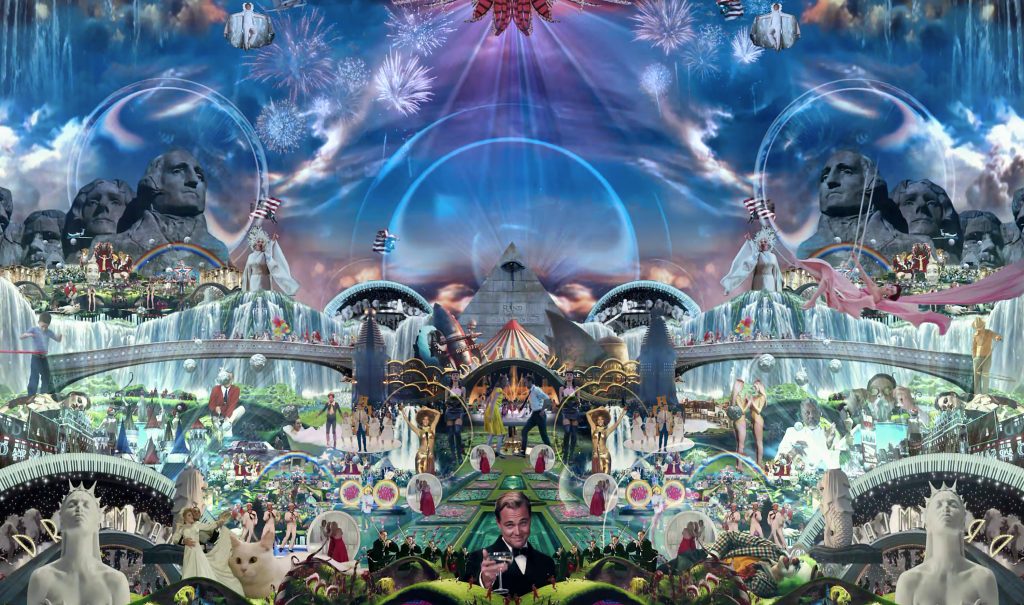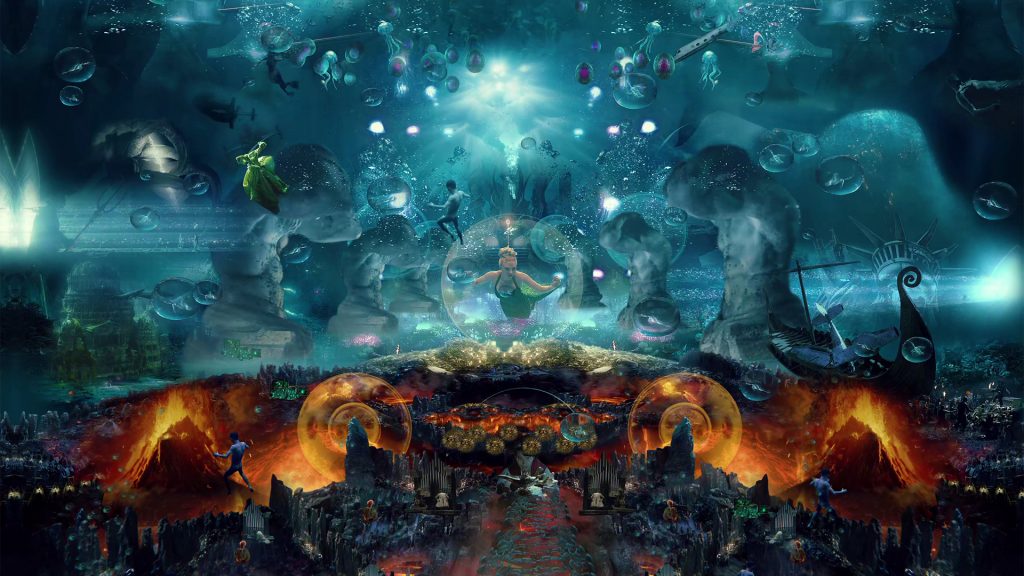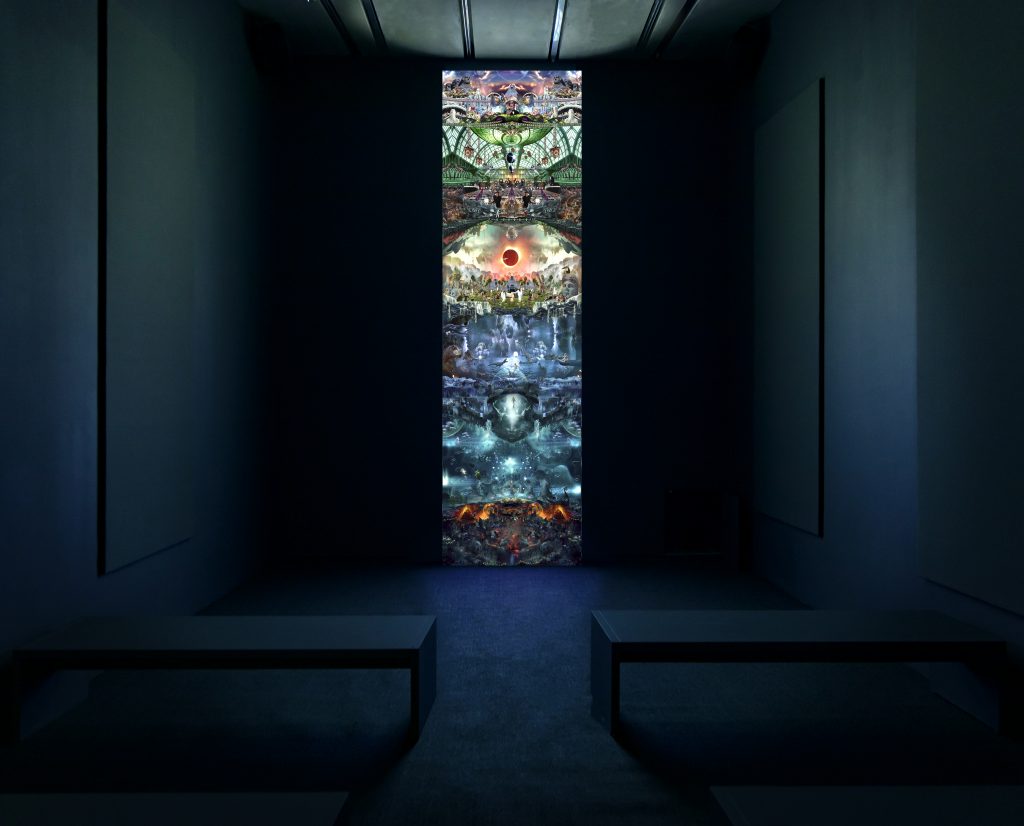People
Courtney Love and Filmmaker Marco Brambilla Have Been Friends for a Decade. Here’s How His New VR Work Changed Their Relationship
The two longtime friends sat down with Artnet News for a wide-ranging conversation.

The two longtime friends sat down with Artnet News for a wide-ranging conversation.

Noor Brara

In the early months of 2020, VR artist and filmmaker Marco Brambilla began working on a video project that sought to capture the look and feel of our times.
Information-saturated and hyperreal, the work is a painstakingly layered landscape of “infinitely looping” collaged film clips and stills that lead viewers through multiple “levels” of what Brambilla calls a “digital totem.” The narrative arc depicts and pokes holes in foundational American promises—among them, the possibilities of capitalism, of Hollywood success, and of organized religion.
The project, titled Heaven’s Gate and on view at the Perez Art Museum in Miami through early next year, explores the complications of “a hyper-sensory parallel universe where the lines between gaming, news, reality TV, and Hollywood are part of the same human epic.”
Brambilla recently sat down with Artnet and his close friend, Courtney Love, to discuss the work and what it means today, what it’s like to be an artist working in 2021, and how Brambilla and Love fared through the pandemic.
Tell me about how this work came to be. You mentioned you began the project in early 2020. What inspired it? How did you go about making it?
Marco: I’ve been making these digital collages since 2008. This is the fourth one I’ve done, and they’re kind of monumental to start with, because you’re dealing with so much material and there’s research and the scripting of the narrative. Then I go into this stream of consciousness where you’re really relying on memories of films and your own personal film knowledge and what could work and what mistakes you want to make. That requires a tremendous amount of uninterrupted focus, so in that sense, I felt last year was the perfect time to have two or three months of a completely uninterrupted thought process. I think the work benefitted from that.
If you were to make a time capsule of 2020, you’re being bombarded by the constant updates about the pandemic, combined with the Donald Trump re-election campaign, for which the media coverage was deafening. So I think there are elements of the work that thematically took on that aspect of this kind of combination of anxiety and introspection, and this idea of trying to make sense of what the world had become last year. Because at a certain point, I don’t think people had any sense of when it would be over or what would develop from it. It was really unknown at that stage. I started working on this in February or March. It also affected the selection of sources, because I found myself using more and more material that was derived from Hollywood musicals and post-depression films, post-WWII films, so it was made from material that was designed to disengage you from difficult times.
I know you don’t like to do this, but if you could give people notes for how to approach it before they see it, what would you say?
Marco: Look, I think for all artwork, the visceral impact of the work should tell its own story. This is a work that functions on a few different levels: a level of immersiveness, a level of entertainment. There’s a thematic element to it, the basis of which is that I was inspired by the seven levels of purgatory as a premise. It fascinated me how every belief system depicts states of being visually, whether it’s a religious belief system or a spiritual belief system. So what if Hollywood had been tasked with creating visuals for a belief system?
There’s an installation in Miami as well, which is more of a totemic story, so you’re actually seeing multiple levels in a physical space. I would hope that anyone seeing it for the first time doesn’t necessarily need the backstory. When Courtney first saw it in VR, her immediate reaction was completely sincere—I mean, I don’t think I told you anything about it before you saw it, right Courtney?
Courtney: No, I just said, “Let me see it.” I was going to see a doctor, and I’d just heard Marco’s voice upstairs. And I love Marco and we’re really good friends and his door was a little ajar and he was in a meeting, an important one, and so I was like, “Hi, I’m here. Can I hang out?” And he’s like “Here, take the VR set, watch the thing.”

A still from Marco Brambilla’s Heaven’s Gate (2021). Photo courtesy the artist.
I recall you posted on Instagram that the project is one of the more beautiful artworks you’ve ever seen.
Courtney: Yeah. I’ve been in recovery for years, but it was like… the best drugs. I am a Buddhist and I’ve been a Buddhist since 1989. Of course I remember the seven purgatory levels, but that never meant anything to me. I just don’t have a Christian bone in my body. But as I was ascending, I thought I was going through the Buddhist levels of hunger, hell, animals, anger, rapture, learning, and then finally enlightenment. So that’s what I thought I was being taken through.
I’m not a person who knows about art. I mean, I went to art school, but I essentially showed up to do the movies and then I left, so I don’t have an education in art history. But I did know Marco as this big-time director who, like my other friend Patti Smith, did the film stuff and then walked away and that’s something I’ve always loved about him. He just doesn’t look back. But ever since I saw his first work, which was during an elevator ride to the Boom Boom Room at the Standard, I loved him. I would stay in the elevator and just ask them to go up and down because it was so amazing. And then I met him, and he was really cool, interesting, smart, sexy, range-y… but you don’t know that this shit is going on in his head.
Marco, you were talking earlier about information saturation and how the work attempts to depict all of these layers in our lives. You’re trying to capture a feeling of what it is to be alive in 2020 and 2021. What, in your view, defines memorable art now? And Courtney, why did this work reach you in such a profound way?
Marco: A meaningful aspect for me is that great art now contains a political charge to it. There’s a sociological aspect to this particular work and it’s delivered through subversion—so the idea of subverting the spectacle and creating this kind of hyper-spectacle, which points out the cracks in every system basically, is a political statement as much as anything is.
Courtney: I’m in the U.K. where I haven’t had to be a celebrity and I can just focus on being an artist. I’m a singer/songwriter, but mostly I’m a poet. And what I’d relate this work to is the work of Alexander Pope in that it’s satirical. But what I realized is there’s a lot of Keats in there. There is romance that Marco’s not talking about as much, but I saw it. I saw really incredible romance, a really romantic side of Marco. I looked at him differently afterwards. It said something about his personhood. I was like, “Wow, it must be fun to be your girlfriend. What would that be like?” He has a very deep soul and doesn’t advertise it in his bearing or his personal life, and I’ve known him for 10 years. In Buddhism, we call it Nichikan, which is 3,000 realms in a single moment of life. It’s like you’re Nichikan. Marco, you left nothing on the table. I thought, “Wow you must be really depleted, because this is incredible.”
Is that how you felt, after making it?
Marco: Yeah, I did, because the context shifted continuously as you were going through 2020 being bombarded by constant, often very disturbing information. It found its way into the work. In fact, there’s a sample I used at the very top section, the apocalyptic section, where the Capitol building is exploding and that was done in December 2020. And then obviously the Capitol riots in January were really a kind of terrifying reminder of what satire and fact and fiction have in common, and how absurd the world had become in 2020.
Courtney: Okay, but if I could add one cherry on top, one more thing to the work, if anyone had listened to me for the past decade, there’d be Britney flying free. That’s all! You mother fuckers never listened to me. Now you listen to me! Marco’s heard the rants for years. [laughs]

A still from Marco Brambilla’s Heaven’s Gate (2021). Photo courtesy the artist.
That would be a great addition, yes!
Marco: One of the next viewings of the piece is going to be at the Havana Biennial in March. That’ll be [a wild] context because we’re looking to show it in buildings that have been dilapidated, and there’ll be this giant video sculpture inside these ruins that once had the promise of capitalism.
Courtney: Not to get too political or anything, but when Biden got in and he gave his foreign affairs speech, he was like, “We’re gonna earn it back, and we’re sorry we blew your trust, world.” And then he goes, “But Burma, you should stop doing this.” That arrogance—I draw sometimes and do paintings on the side, I don’t sell them or anything—but I just did one that’s called Your Rugged Individualism Is Fucking With My Class Structure. Because there is a class system in place. I can spot the Americans, my own people—and I love my own people, but I can spot us being fools in this country and everywhere else. What terrible people we can be, even the most refined of us. There are just so many sides to so many things, and I think Marco’s work really addresses how there’s such a lack of nuance in American capitalism and culture, and it’s all falling apart.
I’d love to backtrack a bit and ask how you got to know each other. How did you become such close friends, and what do you provide each other on an artistic level?
Marco: We haven’t been able to see each other as often as we would like in the last year, obviously, but Courtney comes from a place of a true artist, whether it’s her background as an actress, a musician, or a poet. There’s always an exchange of ideas. The most fulfillment I get is from conversations with other artists and creative people, so Courtney is one of those people who’s a total original. There’s no filter. There’s just raw ideas, and most of them I agree with.
Courtney: [laughs] Marco’s so solid, I look at him as a tree of life. We have a mutual best friend, and when you have a mutual best friend that you love in a unique way that nobody else does, you start to rely on each other. We never talk about our mutual best friend, but we have this love. It’s like if you’re playing guitar, it’s a unique chord that a lot of other people don’t see in this one person, and we both see the same thing, the beauty of this person’s soul. It was in 2010 or 2011 when I realized that Marco saw this too, and that made me very fond of him, but I’m fond of him way beyond that as well.
Marco: Coincidentally, we moved to London around the same time and we were neighbors in New York. You were living at 5 Crosby Street and I was at 101 Crosby. And then London happened about two years ago. And London is fantastic because I think the quality of life is a little bit more manageable than in New York.
Courtney: Yeah, but you’re such a New Yorker!
Marco: I go back a lot to get energized and I go back because I miss the pace of execution, and making things happen, but then when I come back to London there’s more time to reflect, I guess. New York’s a tough place to reflect.
Courtney: Absolutely. And the thing with New York is like, you know as a Californian, I went by there and I’m like, “I’m going to play this Manhattan game, baby.” And you know, it was just too stimulating for me. But when you go back and you see the bodega, you think, “You are the greatest city in the world, I love you. I want to marry you, New York.” It’s very seductive, I have to say.
But in terms of clearing your head, Marco couldn’t be more right. There’s more art here. Some people complain about the tabloids, but I don’t have that issue. [Sometimes] I would get in the Daily Mail, with them calling me “worse for wear.” I didn’t even drink! And I’m “worse for wear?” My eyeliner ran, you assholes. If you don’t ask for it here, in my opinion—if you keep your nose clean and you just work and you do your thing—it’s just so much more head-clearing. I don’t have to be a celebrity here. I don’t even know if I am a celebrity here. Nobody treats me like that. And I love it.
Being in recovery is so much easier here, I’m so much less triggered. But anyway, all of this is to say that one of my best friends in L.A. is [David] LaChapelle and like with Marco, whenever I talk to him, I’ll get a really great art+history lesson which lets me feel like I really understand something. There are very few people that can do that. Like the other day, Jay Joplin had breakfast with us at White Cube, and he walked us through Michael Armitage and oh my god, he’s good at it. And Marco’s sort of done the same in that he’s explained so much to me about art.

Marco Brambilla, Heaven’s Gate (2021) at PAMM. Photo courtesy the artist.
Have you ever gone to a museum or gallery show together?
Courtney: No, we should though. That would be really fun.
Marco: We’ll do it as soon as I get back.
I want to ask you guys about your experience of being artists in 2021. What are the pros and the cons to that?
Courtney: For me, at my age, there aren’t a lot of cons. There are only pros, in the sense of I don’t really have to worry about going on crazy juggernaut tours right now, and I don’t want to. I don’t want to be Marlene Dietrich or some old lady. I’m making a record that is absolutely to my standards and I’m not responding to anyone or anybody. That has a lot to do with being away from L.A. and also recovery, but the pandemic for me—and I didn’t even realize the money that went into glam and being a celebrity and all this stupid stuff I don’t even want to be at—was about saying no to things. And now it’s about seeing friends. I’m not here to do anything other than commit the rest of my life to being embodied by my music and my work. And it feels really liberating, but of course it is a scary time to be alive. For me, creatively though, it’s sort of the best time ever.
Marco: For me, it’s as Courtney said, the opportunity to refocus and recalibrate with this project and everything, I feel like I’ve been able to be myself and fully express myself. And to be able to focus in this this way lately has been really fulfilling.